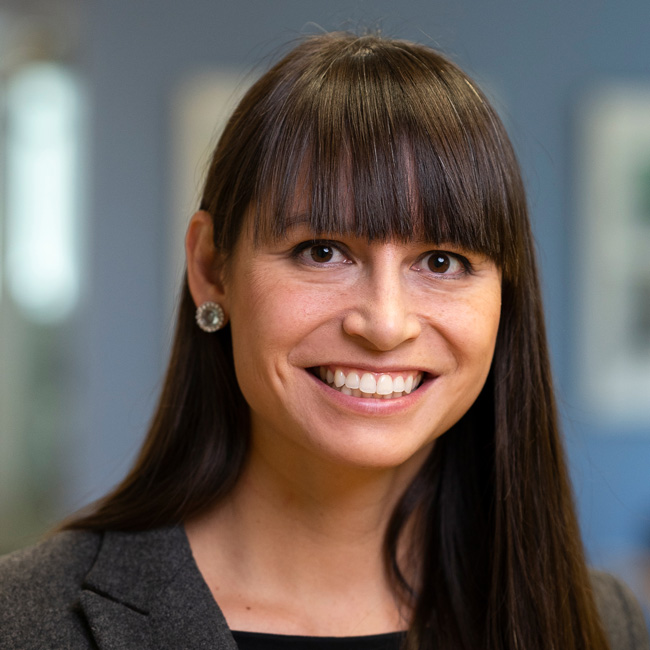Tara Kirk Sell, PhD, MA
Senior Scholar, Associate Professor
Professional Profile
Dr. Sell is a Senior Scholar at the Johns Hopkins Center for Health Security and an Associate Professor in the Department of Environmental Health and Engineering at the Johns Hopkins Bloomberg School of Public Health. At the Center, she conducts, manages, and leads research projects to develop a greater understanding of potentially large-scale health events. She also serves as an Associate Editor of the peer-reviewed journal Health Security. Dr. Sell codirects the Health Security PhD track within the Department of Environmental Health and Engineering.
Dr. Sell’s work focuses on improving public health policy and practice in order to reduce the health impacts of disasters and terrorism. Her primary research interests focus on health security: the broad intersection of public health and national security. She studies past responses to public health emergencies to discover ways to improve future preparedness and response. From terrorism to pandemics and natural disasters, she employs mixed methods and multidisciplinary approaches to examine how the public, practitioners, and policymakers prepare for and respond to public health emergencies. In turn, she works to build the evidence base to advance policies and practices to minimize impacts of emergent threats. Though seemingly distinct, these topics are all linked by crosscutting preparedness and response needs critical to the improvement of the field of health security.
A hallmark of her work is the discovery of scientifically rigorous results while simultaneously interfacing with policymakers, public health practitioners, and the general public to translate research findings into actionable and evidence-based practices. Dr. Sell works collaboratively and purposefully to translate and disseminate findings and recommendations to target audiences in meaningful ways, such as engaging in collaborative work with the Centers for Disease Control and Prevention (CDC) to improve public communication or codeveloping Event 201, an immersive pandemic scenario to engage new stakeholders, such as the private sector, in pandemic preparedness.
Dr. Sell has led several projects focused on improving responses to emerging outbreaks. These include efforts to understand and find solutions for misinformation during highly feared infectious disease outbreaks and to use the wisdom of the crowd through an infectious disease prediction platform that develops forecasts about infectious disease outcomes. Another project, developed with Johns Hopkins University Whiting School of Engineering collaborators, sought to improve understanding of the health impacts and public health response priorities for longer-term electrical power outages.
During the COVID-19 pandemic, Dr. Sell worked on a range of projects to help improve the US response to the outbreak. She provided input on research around the reopening of K-12 schools, advised the design of safe sports bubbles, and analyzed emerging information on the use of nonpharmaceutical interventions in the control of COVID-19. She also collaborated with the World Health Organization (WHO) on the development of the field of infodemiology in response to overwhelming amounts of disinformation and misinformation during COVID-19 and is leading research to improve understanding of better risk communication and management of misinformation during pandemics.
Dr. Sell has been principal investigator on several CDC-funded projects. She currently leads a project to improve trust in public health preparedness and response in the context of an environment of misinformation. She led a mixed-method approach using the Zika virus outbreak as a case study to understand more about how public health communication practices can be strengthened to improve public understanding, acceptance, and response during future infectious disease outbreaks. Another project investigated how decisions on Ebola policies were made at the US state level and what factors beyond CDC guidelines played the most significant roles in shaping state and local policy.
Dr. Sell also led several research projects to provide strategic recommendations regarding the Threat and Hazard Identification and Risk Assessment process and the Chemical and Biological Defense Division in the US Department of Homeland Security. In addition, she conducts research and analysis of the funding and management of civilian biodefense, radiological/nuclear defense, and chemical defense programs in the US government, providing an accounting of federal funding on a yearly basis.
Her other research efforts focus on public health and resilience at a local level, evaluating local responses to recent outbreaks, local public health needs for community engagement, and local capabilities and needs. She co-led the COPEWELL project, a system dynamics model and toolkit to improve community resilience to disasters. Dr. Sell coauthored the Rad Resilient City Preparedness Checklist, which provides cities and their neighbors with actions to save lives in the event of a nuclear detonation.
Prior to joining the Center in 2009, Dr. Sell was a professional athlete. She was a member of the USA national swim team for 8 years and served as captain for 6 USA national swim teams. In 2004, she broke the world record in the 100 breaststroke (Short Course Meters) and earned a silver medal at the 2004 Olympics in Athens.
Dr. Sell completed her PhD at the Johns Hopkins Bloomberg School of Public Health in the Department of Health Policy and Management, where she was a Sommer Scholar. Her dissertation work focused on public policy responses to emerging epidemics and, specifically, how the media and policy intertwined in the case of Ebola and the health consequences of these policy actions. She received a BA in human biology and an MA in anthropological sciences from Stanford University. In 2005, she was a Rhodes Scholar finalist.
Recent Publications
Practical playbook for addressing health misinformation
Fighting the infodemic: the 4 i Framework for Advancing Communication and Trust
Infodemic Management Approaches Leading up to, During, and Following the COVID-19 Pandemic
Courses
1st term (online)
180.634.81 Public Health Emergencies: Risk Communication and Decision Science (3 credits)
2nd term (online)
180.621.81 Protecting the Environment and Safeguarding Worker Health: a Problem-Based Approach (3 credits)

